Intro
Discover 5 essential allergy skin test tips for accurate diagnosis, including preparation, common allergens, and test procedures, to help manage skin allergies and reactions effectively.
Allergies are a common health issue affecting millions of people worldwide. They can cause a range of symptoms, from mild discomfort to life-threatening reactions. One of the most effective ways to diagnose allergies is through skin testing. This method involves exposing the skin to small amounts of potential allergens and observing the reaction. If you're considering getting an allergy skin test, it's essential to be prepared and know what to expect. In this article, we'll provide you with valuable information and tips to help you navigate the process.
Allergy skin tests are a crucial diagnostic tool for identifying specific allergens that trigger reactions. By understanding what you're allergic to, you can take steps to avoid exposure and manage your symptoms. This can significantly improve your quality of life and reduce the risk of severe reactions. Whether you're experiencing skin rashes, respiratory issues, or digestive problems, an allergy skin test can help you get to the root of the problem.
The process of getting an allergy skin test may seem intimidating, but it's relatively straightforward. A healthcare professional will typically perform the test in a clinical setting, using a small device to prick the skin and introduce the allergen. The skin is then observed for signs of a reaction, such as redness, swelling, or itching. The results are usually available within 15-20 minutes, providing valuable insights into your allergies. With this information, you can develop a personalized plan to manage your allergies and prevent future reactions.
Allergy Skin Test Basics
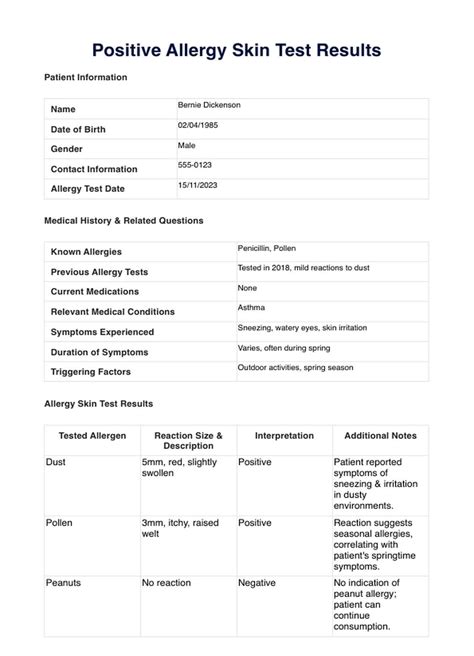
Pre-Test Preparation
Before getting an allergy skin test, there are several things you can do to prepare. This includes avoiding certain medications, such as antihistamines, which can interfere with the test results. You should also inform your healthcare professional about any medical conditions or concerns you may have. Additionally, it's a good idea to wear loose, comfortable clothing and avoid wearing perfumes or fragrances, which can irritate the skin.Types of Allergy Skin Tests
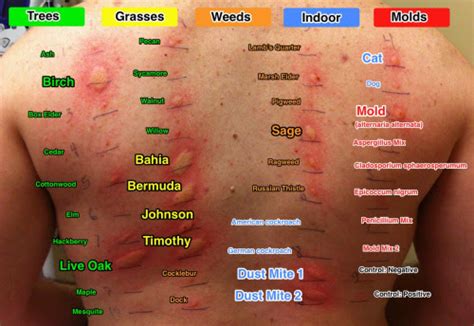
Prick Test vs. Patch Test
The prick test and patch test are two of the most common types of allergy skin tests. The prick test is generally used to diagnose immediate allergic reactions, such as those caused by pollen or dust mites. The patch test, on the other hand, is used to diagnose delayed allergic reactions, such as those caused by skin contact with certain substances. Your healthcare professional will help you determine which type of test is best for your specific needs and circumstances.Allergy Skin Test Results
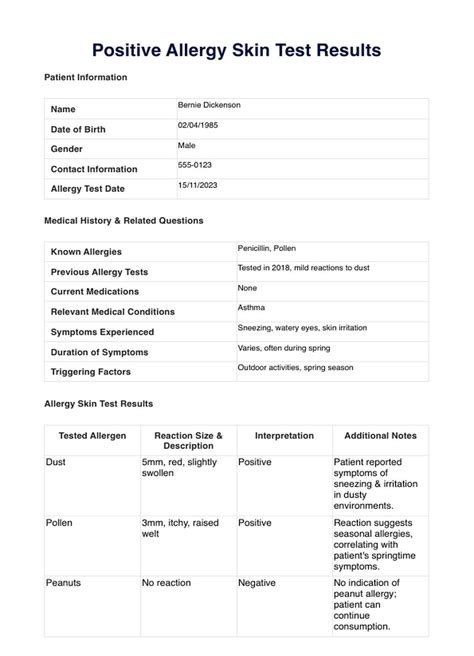
Interpreting Test Results
Interpreting the results of an allergy skin test requires a thorough understanding of the testing process and the potential allergens. A positive reaction to a specific allergen indicates that you are allergic to that substance. The severity of the reaction can also provide information about the severity of the allergy. Your healthcare professional will help you interpret the results and develop a plan to avoid exposure and manage your symptoms.Tips for Getting an Allergy Skin Test
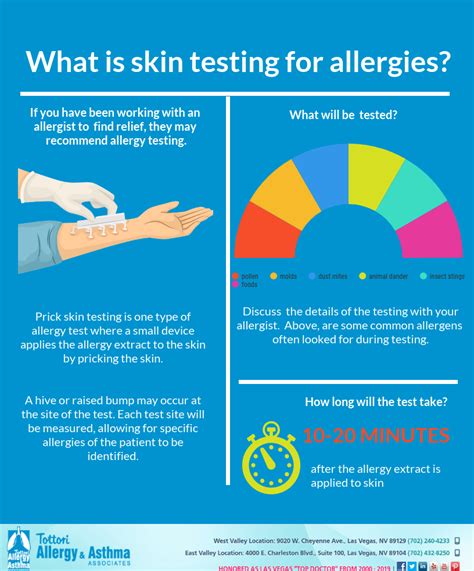
Common Mistakes to Avoid
There are several common mistakes to avoid when getting an allergy skin test. These include: * Not disclosing certain medications or medical conditions, which can affect the test results. * Not following the instructions provided by your healthcare professional. * Not attending follow-up appointments, which can impact the effectiveness of the test. * Not asking questions or seeking clarification if you're unsure about any aspect of the test.Benefits of Allergy Skin Tests
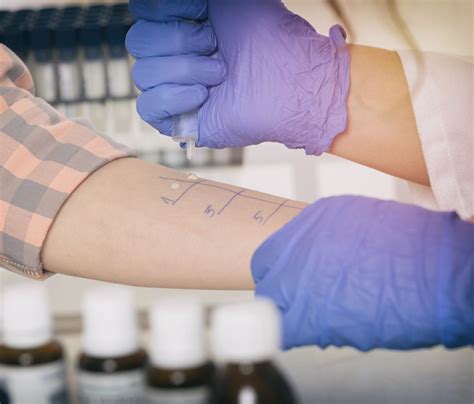
Improved Quality of Life
Allergy skin tests can significantly improve your quality of life by providing valuable insights into your allergies and helping you develop a personalized plan to manage your symptoms. By avoiding exposure to specific allergens and taking steps to manage your symptoms, you can reduce the risk of severe reactions and improve your overall health and well-being.Common Allergens and Their Effects
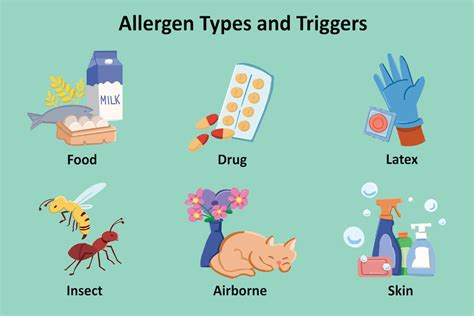
Reducing Exposure to Allergens
Reducing exposure to allergens is a crucial step in managing allergies and preventing future reactions. This can involve taking steps to avoid exposure, such as using air purifiers or avoiding certain foods. Your healthcare professional can provide guidance and recommendations on how to reduce exposure to specific allergens.Managing Allergy Symptoms
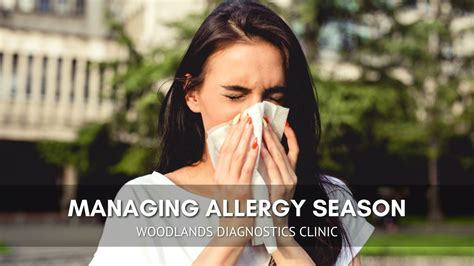
Lifestyle Changes
Making lifestyle changes can significantly improve your quality of life and reduce the risk of severe reactions. This can involve avoiding exposure to specific allergens, using medication as prescribed, and making changes to your diet and environment. Your healthcare professional can provide guidance and recommendations on how to make lifestyle changes to manage your allergies.What is an allergy skin test?
+An allergy skin test is a diagnostic test used to identify specific allergens that trigger reactions. The test involves exposing the skin to small amounts of potential allergens and observing the reaction.
How do I prepare for an allergy skin test?
+To prepare for an allergy skin test, avoid certain medications, such as antihistamines, which can interfere with the test results. Inform your healthcare professional about any medical conditions or concerns you may have. Wear loose, comfortable clothing and avoid wearing perfumes or fragrances, which can irritate the skin.
What are the benefits of allergy skin tests?
+Allergy skin tests offer several benefits, including accurate diagnosis of specific allergies, identification of potential allergens, improved quality of life, and reduced risk of severe reactions.
How do I manage allergy symptoms?
+Managing allergy symptoms requires a comprehensive approach that involves avoiding exposure to specific allergens, using medication as prescribed, and making lifestyle changes to reduce the risk of reactions. Your healthcare professional can provide guidance and recommendations on how to manage your symptoms and improve your quality of life.
What are some common allergens and their effects?
+Common allergens include pollen, dust mites, pet dander, and certain foods, such as peanuts or shellfish. These allergens can cause a range of symptoms, from mild discomfort to severe reactions.
In conclusion, allergy skin tests are a valuable diagnostic tool for identifying specific allergens and managing symptoms. By understanding the basics of allergy skin tests, preparing properly, and following the tips and recommendations outlined in this article, you can take control of your allergies and improve your quality of life. Remember to ask questions, seek clarification, and follow the instructions provided by your healthcare professional to get the most out of your allergy skin test. Share your experiences and tips with others, and don't hesitate to reach out to your healthcare professional if you have any concerns or questions. By working together, you can manage your allergies and live a healthier, happier life.
